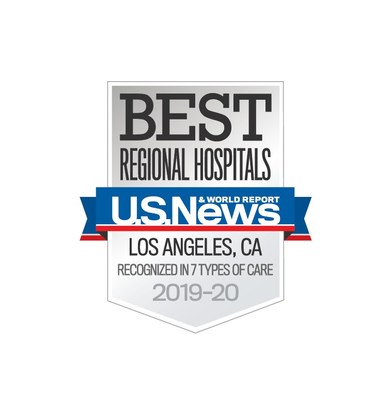LAGUNA HILLS, Calif.,
Oct. 14, 2019 /PRNewswire/ -- Despite
living with Parkinson's disease and undergoing surgical procedures
to clear blocked arteries, Harold (Hal)
Greenberg, 81, keeps busy with show dogs he breeds and
raises.
"When I have challenges with my health, the first thing I think
about is my dogs – what would happen to them? Luckily, I've always
had top doctors at Saddleback who are up on the latest procedures.
Everything's gone smooth as silk," says Hal, who had the
groundbreaking TCAR procedure at MemorialCare Saddleback Medical
Center.
As part of his treatment, cardiologist Margaret Rasouli, M.D, placed Hal on a blood
thinner that helps prevent stroke and heart attack. She ordered an
ultrasound of his carotid arteries that lie on either side of the
neck and extend from the aortic arch –just above the heart to the
base of the skull delivering oxygenated blood to the brain. If
blocked, a potentially life-threatening stroke may occur.
The ultrasound showed substantial build-up of plaque (fatty
deposits) in the left carotid artery. As people age, blood vessels
become less flexible and thicker which can lead to a build-up of
plaque. Undermanaged conditions like obesity, diabetes, high blood
pressure, high blood fat levels, sleep apnea and tobacco use
contribute to the damage.
"When arteries develop plaque, there are multiple ways to manage
the problem," says vascular surgeon Wang
Teng, M.D., F.A.C.S., Saddleback Medical Center peripheral
vascular services medical director. "While the first line of
defense is blood-thinning medication, some cases require surgical
intervention."
With the gold standard of intervention, carotid endarterectomy
(CEA), surgeons access the carotid artery through a four to
seven-inch incision in the neck and remove plaque inside. While the
procedure itself carries a low stroke risk, it requires general
anesthesia, which can be too risky for some patients.
An alternative is a minimally invasive balloon angioplasty and
stenting procedure. Using local anesthesia, a thin catheter with a
deflated balloon at the end is inserted through the femoral artery
near the groin and threaded up to the blockage in the neck. The
balloon is inflated, pressing the plaque against the inner walls of
the artery. A micromesh tube, or stent, is inserted to hold it in
place, ensuring the artery remains open. Though less invasive, it
can cause tiny pieces of plaque to break off and travel to the
brain, increasing stroke risk.
Dr. Teng opted for a new groundbreaking option, Trans Carotid
Artery Revascularization (TCAR).
With TCAR's 2018 FDA approval, Dr. Teng could offer Hal some
advantages of open surgery while performing the less-invasive
balloon angioplasty and stenting procedure.
"During open surgery, the carotid artery is clamped above and
below the blockage to protect the brain from plaque fragments that
might break off and flow upstream while we're working," says Dr.
Teng. "During TCAR, we don't stop blood flow; we reverse it. Stray
bits of plaque are drawn away from the brain and filtered out."
Instead of entering the arterial system through the femoral
artery, a small incision is made at the base of the neck. The
surgeon places a soft, flexible sheath directly into the artery and
connects the other end to a small external device that diverts flow
of blood away from the brain. The blood is filtered and returned
through a second sheath placed in the thigh's femoral vein.
Angioplasty and stenting typically takes less than 10 minutes,
after which the device is switched off and blood flow returns to
normal.
Hal underwent TCAR last December. After one night in the
hospital, he soon returned to his normal routine, caring for nine
dogs and multiple litters of puppies.
"I feel lucky to have been a candidate for TCAR. The shorter
recovery time meant that I was able to return home to my dogs
sooner," says Hal. "I just can't thank my doctors at Saddleback
enough for bringing me back to good health."
TCAR is also performed by vascular surgeons D. Daniel Dearing, M.D., and Rahul Sharma, D.O., at Saddleback Medical
Center.
To learn more and identify a surgeon performing TCAR, visit
memorialcare.org/SBTCAR or call 949-452-7191.
Saddleback Medical Center is listed #45 nationally in
orthopedic surgery by U.S. News & World Report and
achieved high performance rankings for Heart Bypass Surgery, Heart
Failure, Geriatrics, Hip Replacement, Knee Replacement,
Gastroenterology & Gastrointestinal Surgery and Urology. It was
named among America's 50 Best Hospitals, Top 50 U.S. Cardiovascular
Hospitals, consecutively voted among top two Best Orange County
Hospitals by Orange County Register readers, received
American Heart Association/American Stroke Association Stroke Care
Gold Plus, is among first U.S. hospitals to earn
Thrombectomy-Capable Stroke Center certification from The Joint
Commission and American Heart and Stroke Associations and is a
Magnet organization—highest honor for nursing excellence. Centers
of Excellence include cancer, heart, orthopedics, spine, diabetes,
neuroscience, gastroenterology, emergency and critical care, breast
health, imaging, women's health, geriatrics, and minimally invasive
and robotic-assisted surgery. The Women's Hospital at Saddleback
Medical Center offers personalized obstetrics, perinatal programs
and neonatal intensive care unit. It is part of MemorialCare with
200+ care locations, top hospitals--Saddleback Medical Center,
Orange Coast Medical Center, Long Beach Medical Center and Miller
Children's & Women's Hospital Long Beach; MemorialCare Medical
Group; Greater Newport Physicians; Seaside Health Plan;
MemorialCare Research Programs; and outpatient surgery, imaging,
dialysis, urgent care, health and breast centers in Southern California. Visit
www.memorialcare.org/saddleback.

 View original content to download
multimedia:http://www.prnewswire.com/news-releases/memorialcare-saddleback-medical-center-offers-groundbreaking-tcar-procedure-300938173.html
View original content to download
multimedia:http://www.prnewswire.com/news-releases/memorialcare-saddleback-medical-center-offers-groundbreaking-tcar-procedure-300938173.html
SOURCE MemorialCare Saddleback Medical Center